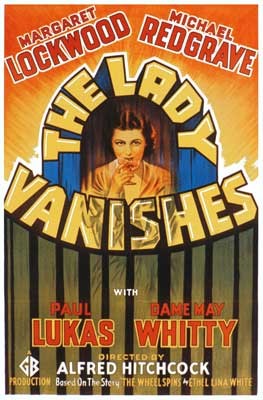- The Lady Vanishes (1938 film)
Infobox_Film
name = The Lady Vanishes

caption = Original movie poster
director =Alfred Hitchcock
writer =Sidney Gilliat Frank Launder Ethel Lina White (novel)
starring =Margaret Lockwood Michael Redgrave Paul Lukas Dame May Whitty Cecil Parker Linden Travers Naunton Wayne Basil Radford Mary Clare Philip Leaver Catherine Lacey Googie Withers
producer = Edward Black (uncredited) forGaumont British Films
music =Louis Levy
Charles Williams
(both uncredited)
cinematography =Jack E. Cox
editing =R. E. Dearing
distributor =Gaumont British Films (original UK distributor) MGM (UK)
released = flagicon|USANovember 1 ,1938
flagicon|UKDecember 25 ,1938
followed_by =Night Train to Munich (debated)
runtime = 97 min
country = UK
language = English
imdb_id = 0030341
amg_id = 1:28077"The Lady Vanishes" (1938) is a
film directed byAlfred Hitchcock . Originally planned as "The Lost Lady" and to have been directed byRoy William Neill , it was adapted bySidney Gilliat andFrank Launder from thenovel "The Wheel Spins" byEthel Lina White [This novel was serialised in 6 weekly 15 minute parts, read byBrenda Blethyn , from 7 March 2008 onBBC Radio 2 .] . It starredMargaret Lockwood ,Michael Redgrave and Dame May Whitty. Also in the cast werePaul Lukas ,Cecil Parker ,Linden Travers ,Naunton Wayne ,Basil Radford ,Mary Clare ,Googie Withers ,Catherine Lacey , andSally Stewart .A remake, also entitled "The Lady Vanishes", was made in 1979.
ynopsis
In Bandrika, a
fictional country in an "uncivilized" region of immediately pre-World War II Central Europe , [It has often been wrongly stated that the action of the movie is set in Nazi-controlledAustria , though Bandrika may be seen as a substitute for such. Bandrika's fictitious language has similarities to Italian, Hungarian and German.] a motley group of travellers eager to return to England is delayed by an avalanche that has blocked the railway tracks. Among the train passengers are Gilbert (Michael Redgrave ), a young musicologist who has been studying the folk songs of the region, Iris (Margaret Lockwood ), a young woman of independent means who has spent a holiday with some friends, but is now returning home to get married, and Miss Froy (May Whitty ), an elderly lady who has worked some years abroad as agoverness .meant for Miss Froy). When she reawakens, the governess has vanished. Iris is shocked to learn that the other passengers claim Miss Froy never existed. The other English travelers deny ever seeing her, for their own reasons.
Fellow passenger Doctor Egon Hartz (
Paul Lukas ) convinces everyone that she must be hallucinating due to her accident. Undaunted, Iris starts to investigate, joined only by a skeptical Gilbert, with whom she eventually falls in love. They discover that Miss Froy is being held prisoner in a sealed-off compartment supposedly occupied by a seriously ill patient being transported to an operation. They manage to free her, but the train is diverted to a side track, where a shootout ensues. Miss Froy intimates to Gilbert and Iris that she is in fact a Britishspy assigned to deliver some vital information (the famous HitchcockMacGuffin ) to the Foreign Office inLondon ; after entrusting her message, encoded in a folk song, to Gilbert, she flees under cover of the shootout.After managing to restart the train and escape, Gilbert and Iris return to
London . [Nothing of the characters' journey between the shootout and Victoria station appears, though their arrival at Victoria shows that they have taken the boat-train from Calais toDover Harbour railway station , whose London terminus was Victoria. The Victoria scene also includes Hitchcock's cameo role in the film, smoking a cigarette.] At the Foreign Office, Gilbert, driven to joyful distraction when Iris accepts his marriage proposal, forgets the tune. Just as it appears the message has been lost, the coded folk song is heard in the background. Fortunately, Miss Froy has also made good her escape and is seen playing the song on a piano.Adaptation
The plot of Hitchcock's film differs considerably from White's novel. In "The Wheel Spins", Miss Froy really is an innocent old lady looking forward to seeing her octogenarian parents; she is abducted because she knows something (without realising its significance) that would cause trouble for the local authorities if it came out. Iris' mental confusion is due to sunstroke, not a blow to the head. In White's novel, the wheel keeps spinning: the train never stops, and there is no final shootout. Additionally, the supporting cast of English people differs somewhat between the novel and the film; for instance, in the novel, the Gilbert character is Max Hare, a young English engineer (described as "untidy and with a rebellious tuft of hair", and in a similarly chirpy vein to Gilbert) building a dam in the hills who knows the local language, and there is also a modern-languages professor character who acts as Iris's and Max's interpreter who does not appear in the film. The characters
Charters and Caldicott were created for the film, and do not appear in the novel.Hitchcock used the story again in the series "
Alfred Hitchcock Presents " in the episode "Into Thin Air".Cultural references
*Gilbert refers to driving "a miniature [steam] engine on the Dymchurch line", referring to the
Romney, Hythe and Dymchurch Railway .
*Gilbert impersonatesSherlock Holmes andWill Hay in one scene.References in later film
*The film was the first appearance of the comedy double-act
Charters and Caldicott (played byNaunton Wayne andBasil Radford ). The first of these characters' many recurrences was in "Night Train to Munich ".
*The film "Flightplan " (2005) has some similarities to this movie, although the filmmakers deny it was an influence.References
Bibliography
*The Great British Films, pp42-44, Jerry Vermilye, 1978, Citadel Press, ISBN 080650661X
External links
*imdb title|id=0030341|title=The Lady Vanishes
*" [http://www.rottentomatoes.com/m/1011813-lady_vanishes/ The Lady Vanishes] " atRotten Tomatoes
* [http://www.tcmdb.com/title/title.jsp?stid=80706 "The Lady Vanishes" at the AFI/Turner Classic Movies database]
* [http://www.criterion.com/asp/release.asp?id=3&eid=31§ion=essay Criterion Collection essay by Michael Wilmington]
* [http://video.google.com/videoplay?docid=-6907491403416789508 Google Video]
Wikimedia Foundation. 2010.
